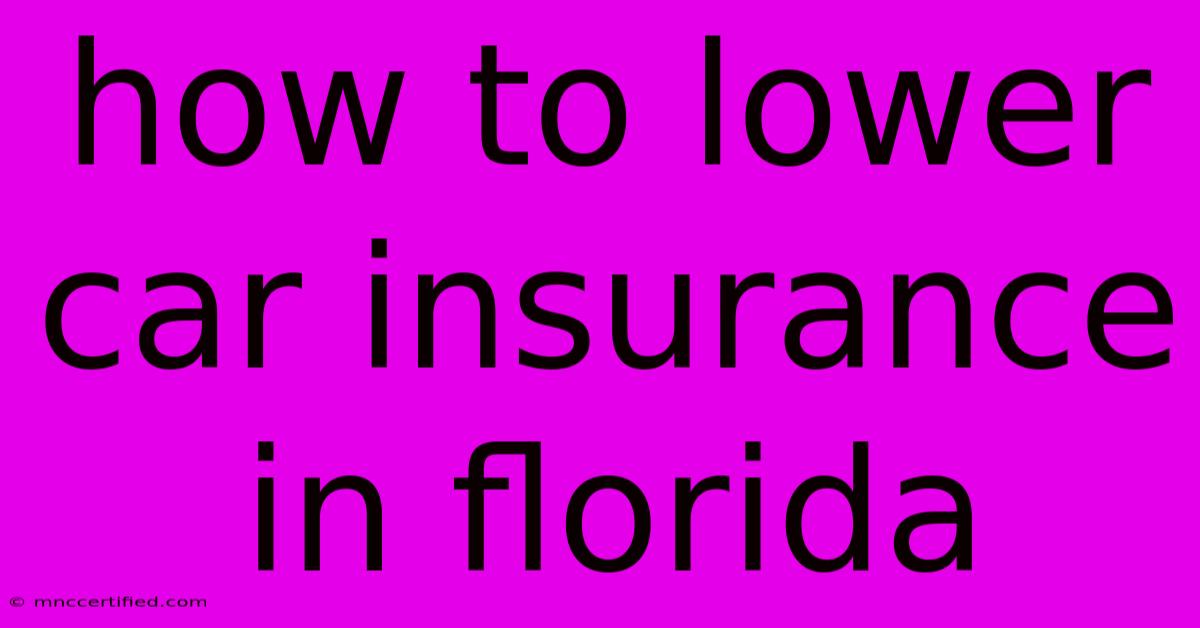How To Lower Car Insurance In Florida

Table of Contents
How to Lower Your Car Insurance in Florida: A Comprehensive Guide
Florida, known for its sunshine and beaches, also boasts a robust auto insurance market. However, car insurance premiums can be a significant expense for many Floridians. Navigating this market can seem daunting, but with a little knowledge and effort, you can find ways to significantly reduce your insurance costs.
Here's a breakdown of key strategies to lower your car insurance in Florida:
1. Shop Around and Compare Quotes
The first step to saving on car insurance is to compare quotes from multiple insurers. Don't settle for the first offer you get – take the time to explore different options.
- Use Online Comparison Tools: Websites like Insurify, Policygenius, and NerdWallet provide convenient platforms to compare quotes from multiple insurance providers.
- Contact Insurance Companies Directly: Reach out to major insurers like State Farm, Geico, Progressive, and Allstate to obtain personalized quotes.
- Consider Local and Regional Insurers: Look into smaller, regional insurers that might offer competitive rates tailored to Florida residents.
2. Improve Your Driving Record
Your driving history heavily influences your insurance premium. A clean record translates to lower premiums.
- Avoid Traffic Violations: Tickets for speeding, reckless driving, or DUI can drastically increase your insurance costs.
- Maintain a Safe Driving Record: Driving defensively and avoiding accidents is crucial to keeping your rates low.
- Complete a Defensive Driving Course: Enrolling in a defensive driving course can often earn you a discount and demonstrate your commitment to safe driving.
3. Choose a Car with Safety Features
The type of car you drive plays a significant role in your insurance rates.
- Opt for Safer Vehicles: Vehicles equipped with advanced safety features like anti-lock brakes, airbags, and electronic stability control are often associated with lower insurance premiums.
- Consider Safety Ratings: Check the safety ratings from organizations like the IIHS (Insurance Institute for Highway Safety) and the NHTSA (National Highway Traffic Safety Administration).
- Choose a Vehicle with a Good Safety History: Cars with a history of fewer accidents and injuries tend to have lower insurance costs.
4. Bundle Your Policies
Bundling your car insurance with other policies like homeowners, renters, or life insurance can often earn you significant discounts.
- Talk to Your Current Insurer: Check if your existing insurer offers discounts for bundling policies.
- Explore Bundling Options: Compare quotes from multiple insurers to see which offers the most favorable bundled rates.
5. Increase Your Deductible
A higher deductible means you pay more out of pocket in case of an accident, but it can lead to lower premiums.
- Assess Your Risk Tolerance: Consider how comfortable you are with a higher deductible and the financial implications of a potential claim.
- Balance Cost and Deductible: Determine the ideal balance between your deductible amount and the resulting premium savings.
6. Explore Additional Discounts
Many insurers offer various discounts that can further reduce your car insurance premiums:
- Good Student Discount: This applies to students with good grades and can significantly lower your rates.
- Safe Driver Discount: If you have a clean driving record for a specified period, you can often qualify for a safe driver discount.
- Loyalty Discount: Staying with the same insurer for an extended period can sometimes earn you a loyalty discount.
- Telematics Programs: These programs utilize technology to track your driving habits and offer discounts based on safe driving practices.
- Military Discount: If you are in the military or a veteran, you may be eligible for a discount.
7. Stay Informed About Florida's Auto Insurance Laws
- Florida No-Fault Insurance Law: This law requires all drivers to have Personal Injury Protection (PIP) coverage, which covers medical expenses regardless of fault in an accident.
- Property Damage Liability Coverage: This is also mandatory in Florida and covers damages to other vehicles or property in an accident.
- Understanding Your Coverage: Thoroughly review your insurance policy to understand your coverage limits and ensure you have the right amount of protection.
8. Consider Alternative Payment Options
- Pay Annually: Paying your premium annually can sometimes result in a lower overall cost compared to monthly payments.
- Utilize Payment Plans: If you need more flexibility, explore payment plans offered by your insurer.
9. Maintain a Good Credit Score
While not directly related to driving, your credit score can impact your insurance premiums in some states.
- Improve Your Credit History: Building a good credit history can often lead to lower insurance rates.
10. Avoid Fraudulent Claims
Filing false claims or exaggerating damages is a serious offense and can result in hefty penalties, including increased premiums or even the cancellation of your policy.
Remember: It's important to compare quotes from multiple insurers, understand your coverage options, and stay informed about Florida's auto insurance laws. By following these strategies, you can significantly reduce your car insurance costs in Florida and ensure you have the right level of coverage.

Thank you for visiting our website wich cover about How To Lower Car Insurance In Florida. We hope the information provided has been useful to you. Feel free to contact us if you have any questions or need further assistance. See you next time and dont miss to bookmark.
Featured Posts
-
Using 401k To Buy Investment Property
Nov 10, 2024
-
1991 Fleer Ken Griffey Jr Barry Bonds
Nov 10, 2024
-
Meghan And Harry Wedding Guest Cant Believe I Missed It
Nov 10, 2024
-
How To Invest In Ev Charging Stations
Nov 10, 2024
-
Truspire Retirement Insurance Company
Nov 10, 2024